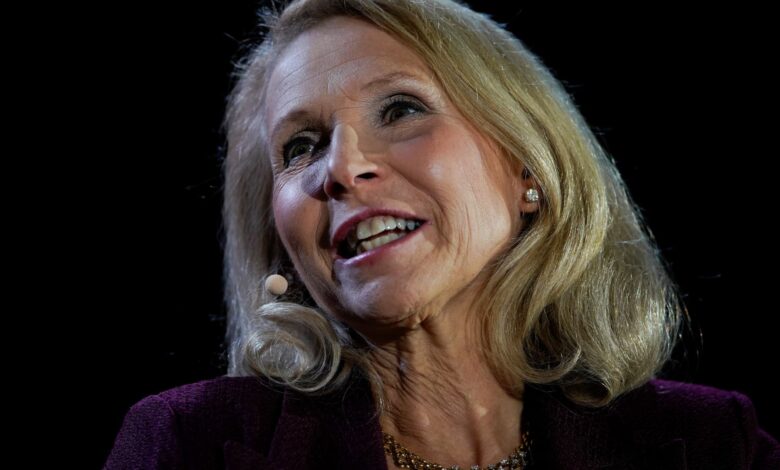Why Shari Redstone needs the right deal

Shari Redstone, president of National Amusements, speaks at the WSJ Tech Live conference in Laguna Beach, California, on Oct. 21, 2019.
Mike Blake | Reuters
Paramount Global nonexecutive chair and controlling shareholder Shari Redstone has been talking to potential buyers interested in acquiring her media company — or parts of it for years — but the seriousness of those discussions has heightened in recent months.
There are sector-related reasons for why a deal seems increasingly urgent. The media world is changing rapidly. During the Covid-19 pandemic, legacy media companies seemingly had a path to growth by launching their own streaming services. But Wall Street turned its collective back on that narrative after Netflix growth stalled in 2022, leaving companies such as Paramount Global twisting in the wind.
Paramount Global’s flagship streaming service, Paramount+, has successfully accumulated 63 million subscribers, and it’s still growing. But it’s also still losing money, albeit not as much as it used to. Third-quarter streaming operating losses were $238 million. A year ago, they were $343 million.
Without a clear growth narrative, Paramount Global has struggled as a publicly traded company. Shares are down 56% in the past two years. This has piqued the interest of some private equity firms and other potential buyers, including David Ellison at Skydance Media and media mogul Byron Allen.
If Paramount Global — which owns Paramount Pictures, CBS, cable networks such as Nickelodeon and Comedy Central, and intellectual property such as “Star Trek” and “SpongeBob SquarePants” — is withering as a publicly traded company, perhaps taking it private or selling some of the assets for parts makes more sense.
Redstone has personal reasons for considering selling now, too. She has long had an active interest in Jewish causes, including having served on the board of Combined Jewish Philanthropies.
Redstone’s focus on fighting antisemitism has increased since the Oct. 7 Hamas terrorist attack on Israel, which killed about 1,200 people, according to people familiar with Redstone’s thinking.
“Look, I’m not doing well, to be honest,” Redstone told The Hollywood Reporter in October. “I think there are no words to describe what took place, and all I do every day is try to do something that’s going to make a difference and help people.”
President of National Amusements Shari Redstone arrives at the annual Allen and Co. Sun Valley media conference in Sun Valley, Idaho, on July 5, 2022.
Brendan Mcdermid | Reuters
Then there’s a significant financial consideration related to National Amusements Inc., or NAI, the holding company that owns the majority of Paramount Global’s voting shares.
When Redstone’s father, Sumner Redstone, the founder of National Amusements, died in 2020, Shari Redstone inherited his shares. National Amusements directly or indirectly through subsidiaries owns 77% of the Class A voting stock of Paramount Global and 5.2% of the Class B common stock, constituting about 10% of the overall equity of the company.
According to tax law, Shari Redstone must pay taxes on the shares tied to their value at the time of her father’s death. That amounts to more than $200 million, according to a person familiar with the matter.
Redstone has deferred the tax bill for 10 years, until 2034, and only owes about $7 million this year, said the person, who asked not to be named because the details are private. Still, the looming tax payment, along with an additional $37 million debt payment due to Wells Fargo in March, could be compelling motivation to sell off National Amusements for cash, rather than a trade of equity with a strategic partner.
National Amusements will make its March payment on time, according to a Redstone spokesperson.
“National Amusements has significant assets including our well-located movie theaters in the US, UK and Latin America, owned real estate properties and shareholding in Paramount Global. We continue to take steps to improve our financial position including through debt reduction with a meaningful paydown in March,” the spokesperson said.
The right kind of deal
Redstone’s varied motivations for selling mean she’s looking for the right kind of deal, at the right price — and so far, she has had options.
Warner Bros. Discovery has held preliminary talks to acquire Paramount Global. While Warner Bros. Discovery board member John Malone suggested in an interview with CNBC in November that Paramount Global could be a future distressed asset, that fate can be avoided if CEO Bob Bakish can make Paramount+ profitable.
There could be structural issues with a Warner Bros. Discovery deal, in terms of a cash-stock split, including how much debt a combined company would want to carry. It’s also possible Warner Bros. Discovery may choose to wait to see if Comcast is willing to part with NBCUniversal.
In early talks with buyers, Redstone has pushed for a high premium for both National Amusements and Paramount Global, according to people familiar with the matter. Paramount Global has a market capitalization of nearly $10 billion and about $13 billion of net debt.
Redstone also has fiduciary duties as Paramount Global’s nonexecutive chair. If she agrees to sell either National Amusements or all of Paramount Global, she’ll need buy in from other investors.
Banker Byron Trott, who is helping Redstone navigate sale talks, has long been an advisor for Warren Buffett, whose Berkshire Hathaway is Paramount Global’s largest Class B shareholder.
No deal is imminent, said people familiar with the process. As CNBC reported last month, Skydance is interested in acquiring NAI as part of a two-step transaction that would involve merging Skydance with Paramount Pictures.
Talks are further along with Redstone regarding NAI than they are with Paramount Global, two of the people said. Still, Skydance is only interested in acquiring NAI if it can get a deal done with Paramount Global, CNBC reported in January.
Spokespeople for Skydance, National Amusements and Paramount Global declined to comment.
Charter renewal
There’s also the issue of Charter‘s looming carriage deal with Paramount Global, which is set to expire in April, according to people familiar with the matter. This may not be guiding Redstone’s urgency for a sale, as a likely deal will be reached long before an acquisition closes, but it’s certainly looming over the company’s future prospects.
While Comcast, the largest U.S. cable provider, and Paramount Global renewed their deal with little fanfare in December, Charter is a different animal. The second-largest U.S. cable operator struck a deal with Disney last year that paved the way for Charter to begin lopping off little-watched cable networks while directly selling subscription streaming services to its millions of broadband customers.
Paramount Global charges $5.99 per month for Paramount+ with advertising. Most of what airs on CBS and Paramount Global’s cable networks is available on Paramount+. That gives Charter two advantages in a renewal deal.
First, Charter will likely argue Paramount Global has set a price of $5.99 for the value of all its cable networks and CBS. Charter can point to that as the ceiling price for what it’s willing to pay for Paramount Global’s linear channels.
Second, Charter now has some blackout leverage with consumers because they can point them toward Paramount+ as a relatively inexpensive way of accessing Paramount’s content. Charter will make the same argument it did with Disney: The existence of the same content on both the streaming service and the linear channels is effectively double charging the consumer.
Bob Bakish, CEO of Paramount, speaks with CNBC’s David Faber on Sept. 6, 2023.
CNBC
Paramount Global probably can’t afford to lose carriage for the bulk of its networks with Charter, given Paramount+ continues to lose money. Paramount Global is still dependent on its linear business, which earned $15 billion of its $22 billion in revenue in the first nine months of 2023 from traditional TV. More than $6 billion of that was from cable affiliate fees.
Bakish has always successfully reached renewal deals with the major pay TV distributors since taking over as CEO in 2019 and even dating back to his time running Viacom, beginning in 2016. Still, given Bakish’s lack of leverage, he may have to settle for lower affiliate fees or an agreement that devalues Paramount+.
Disclosure: Comcast owns NBCUniversal, the parent company of CNBC.
WATCH: CNBC’s Jim Cramer on Paramount Global
Don’t miss these stories from CNBC PRO:
Source link



